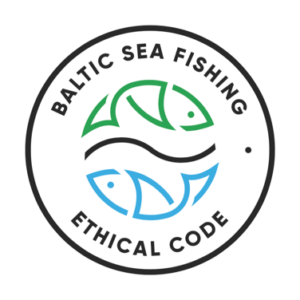LaheKala stands for sustainable fishing practices. This means that we respect fish as well as other parts of nature and nature itself. We ask You to do the same and only catch as much fish as you can eat. Let’s treat fish with dignity. Let’s respect other people around you, keep the environment clean and leave no trash behind. Moreover, any fish that is too small should be released back in the water, and it should only be touched with wet hands.
BALTIC SEA FISHING ETHICAL CODE
Respect fish, man and nature.
This ethical code is divided into the principles and values of the fishing tourism businesses and associated partners within the Baltic Sea Fishing cooperation, and the ethical guidelines for ALL fishing performed under this label.
Principles & Values
We give back to Baltic Sea fish populations.
We depend on natural resources; therefore, we give back using earmarked funds derived from fishing tourism to local coastal fish conservation measures – primarily to strengthen seatrout populations.
We act as sportfishing ambassadors.
We make sure to convey knowledge about sustainable sportfishing and positive effects of angling; use specific and modern equipment and methodologies intended for fishing respective target fishes; practice good seamanship; and take pride in knowing the environment and how to protect it.
We provide high quality services.
We make sure to understand the needs and ambitions of our customers and strive to realize them; are aware of our role as fishing guides, when to teach and when to guide; are in the forefront of angling skills and know the best local fishing spots. We use free time to find new productive areas, which will develop us as guides and increase our reputation among our customers.
We ensure safe fishing experiences.
When fishing from boats, we are licenced to take tourists onboard. These requirements depend on national legislation but in many cases, we hold licences with more strict requirements. We make sure to have all the needed insurances, however, as no insurance covers all contingencies, personal accident insurances are required for all customers.
We aim to reduce our environmental impact.
We maintain our vehicles and vessels in good condition and take responsibility for our own individual environmental footprint; aim to move to newer, lower emission vehicles and outboards when possible.
We aim to improve knowledge about our fish stocks.
We participate in scientific surveys in our respective destinations and follow reporting requirements; keep log book over catches, including unusual, spectacular catches and findings of non-indigenous species.
Finally, we ensure that ALL customers fishing under this label are informed of the ethical guidelines.
ETHICAL GUIDELINES
We adhere to local and current sportfishing rules and regulation: Such as minimum (and in cases maximum) landing fish sizes; only use allowed fishing gears and methodologies; respecting permanent and seasonal protected areas and nature reserves and/or species. All in accordance to the national rules.
We practice and promote Catch & Release: We only use active fishing methods which makes Catch & Release practice possible and handle catches with care and with minimum time out of the water. To minimize negative impact on caught fish, at all fishing occasions the best available technique is used and following equipment shall be at hand: knotless seine, specifically designed plier(s), special designed fishing measure mat and weight sling. Catch & release fishing is illustrated in the film from the CATCH project – https://youtu.be/FXzG_aPfgvc
We respect the Bag-limits: Maximum catches of following fish species to keep per person per day, on the condition that the fish are within the minimum and maximum size limits:
Perch – 5, Pike – 1, Zander (Pike-perch) – 1, Sea trout– 1, Salmon – 1
Kill fish immediately when kept and remember that the largest fishes and always release “mega-spawners” – the largest individuals which are most important for fish reproduction.
We manoeuvre with caution: We do not want to disturb reproducing fish. When using a boat, operate it in a way that is safe for the customer and with considerations for wildlife and nature; exercise caution in sensitive breeding areas for fish and sea birds when using the main engine regarding swell and contact with sea bed; in areas too shallow for the main engine, an electric engine should be used.
We do not try to achieve success by disturbing other anglers/guides in a limited area. Fish somewhere else or at a different time. A general rule is not closer than 300 meters from another angler, although there are exemptions in land-based fishing and occasionally also when using boats.
We avoid fishing in the same area for several days at a time. Change location and area as far as possible to reduce pressure on fish stocks.
We keep our natural surroundings and sea clean. Bring your garbage back home, always try to bring back litters of other’s as well.
We minimize intake of alcohol. In respect for what we are doing, promote minimized intake of alcohol when fishing.
We only use established roads and tracks and drive on beaches where it is permitted. Treat all natural areas as fragile.
We use VHF radio communication responsibly. Radio communication among anglers through radio can improve fishing experiences. However, keep in mind that its primary function is for security, do not block channels meant for security and rescue purposes (i.e. channel 16, 156,8 MHz).


